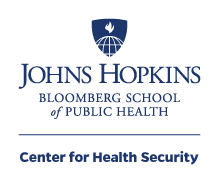Multilateral Strategic Dialogue on Biosecurity
Singapore, Malaysia, Indonesia, United States
The UPMC Center for Health Security hosted the first meeting of a multilateral biosecurity dialogue between partners representing the United States, Singapore, Malaysia, and Indonesia. This effort was supported by the Project on Advanced Systems and Concepts for Countering WMD and sponsored by the US Defense Threat Reduction Agency. The meeting took place at the US Institute of Peace in Washington, DC, and included discussions on pandemic preparedness, the threat of bioterrorism, regional coordination for addressing cross-border threats, and intersectoral collaboration during biosecurity emergencies. The meeting also featured a day-long tabletop exercise examining state and regional responses to a series of transnational bioterrorist attacks.”
Agenda
June 24, 2015
Welcome, Goals of Meeting, and Dialogue Participant Introductions
Dr. Tom Inglesby
Director, UPMC Center for Health Security
Ms. Anita Cicero
Deputy Director, UPMC Center for Health Security
Session 1: Perspectives on Biosecurity
Singapore, Malaysia, Indonesia, and the US have different histories, cultures, and priorities that inform their respective views on biosecurity and biological weapons. During this opening session, we will begin to discuss how leaders in government and other experts approach the risk of biological threats in each country. What major national institutions are responsible for both bioterrorism and disease epidemic preparedness and response strategies? How do history and the current political climate in each country affect national attitudes toward biosecurity? What “black swan” events are most concerning to you?
Opening Remarks: Tikki Elka Pangestu, Tjandra Yoga Aditama, Ken Bernard, Lokman Hakim Bin Sulaiman
Session 2: Detecting Biological Threats What types of biosurveillance systems (eg, human disease surveillance, environmental detection) are in place to detect natural or deliberate biological threats? Do you feel that they are sufficient? Which agencies are in charge of such systems? Do you have challenges in communicating between the public health and defense communities? How would you distinguish between an outbreak and the use of a biological weapon? Do your human and animal surveillance systems/communities interact?
Opening Remarks: Chong Chee Kheong, Michelle Yap, Ratna Sitompul, Noreen Hynes
Session 3: Future Approaches to Combating Biological Threats
Participants will exchange ideas about potential future priorities and approaches to prevention, response, and recovery from biological threats (natural, accidental, deliberate). What are the most difficult technical, political, or organizational challenges faced by your Ministry of Health? Home Affairs? Defense? To what extent do current international/regional engagement initiatives improve preparedness and response for biological threats? What works? What doesn’t? Give examples of gaps and challenges.
Opening Remarks: Manikavasagam Jegathesan, Vernon Lee, Julie Fischer, Daniel Tjen
Presentation: DoD Strategies for Countering Biological Threats
CDR Franca R. Jones, MS, PhD
Director, Medical Programs
Office of the Assistant Secretary of Defense for Nuclear, Chemical, and Biological Defense Programs
Session 4: Leadership Strategies During Major Biological Events
If a serious outbreak of a rapidly spreading infectious disease emerges in your nation or in a neighboring nation, or if there is an act of bioterrorism close to home, how should your leaders react? Is it clear who would be in charge? How well are agencies poised to cooperate? How would sensitive information from the intelligence community be conveyed to the public health community in the event of an act of bioterrorism? Would leadership change depending on whether the event is naturally occurring or man-made? Would one leader or well-known figure be tasked with all public communication?
Opening Remarks: Seth Carus, Endy M. Bayuni, Zalini Yunus, Kwa Chong Guan
Meeting with Dr. Beth Cameron and Laura Holgate to discuss the Global Health Security Agenda, Eisenhower Executive Office Building
June 25, 2015
Tour of the Secretary's Operations Center (SOC), which is the focal point for critical public health and medical information in the US government. The tour will be followed by a presentation on US regional cooperation.
Dr. Maria Julia Marinissen, Director of International Health Security Office of Policy and Planning, Office of the Assistant Secretary for Preparedness and Response
Presentation: US DoD Experiences During Ebola
Major General John P. Horner, Deputy Director of the Defense Threat Reduction Agency
Bioterrorism Tabletop Exercise
Debriefing and Impressions of Exercise
Wrap-up and Discussion of Topics for Next Dialogue Session in Malaysia
Meeting Participants
Endy M. BAYUNI
Senior Editor
The Jakarta Post
Kenneth BERNARD, MD
USPHS (ret.)
Advisor
National Security and Biodefense
W. Seth CARUS, PhD
Distinguished Research Fellow
Center for the Study of Weapons
of Mass Destruction
National Defense University
CHONG Chee Kheong, PhD, MPH
Director of Disease Control Division
Ministry of Health Malaysia
Anita CICERO, JD
Chief Operating Officer and Deputy Director
UPMC Center for Health Security
Julie E. FISCHER, PhD
Associate Research Professor of Health Policy
Milken Institute School of Public Health
The George Washington University
Gigi GRONVALL, PhD
Senior Associate
UPMC Center for Health Security
MG John P. Horner
Deputy Director
Defense Threat Reduction Agency
William P. HOSTYN, MS
Director, Advisory Committees and Programs Office
Defense Threat Reduction Agency
Noreen HYNES, MD, MPH
Associate Professor of Medicine (Infectious Diseases) and Public Health (International Health)
Director, Geographic Medicine Center of the Division of Infectious Diseases
Johns Hopkins University
Tom Inglesby, MD
Chief Executive Officer and Director
UPMC Center for Health Security
Manikavasagam JEGATHESAN, MD
Universiti Sains Malaysia
And Intra-Global Connections sdn bhd
CDR Franca R. JONES, MS, PhD
Director, Medical Programs
Office of the Assistant Secretary of Defense for Nuclear, Chemical and Biological Defense Programs
Stefanie Li Yee KAM, MSc, MA
Researcher
S. Rajaratnam School of International Studies
KWA Chong Guan, MA
Senior Fellow
S. Rajaratnam School of International Studies
Nanyang Technological University
Vernon LEE, MBBS, PhD, MPH, MBA, FAMS
Head, Singapore Armed Forces
Biodefence Center
Adjunct Associate Professor
Tikki Elka PANGESTU, PhD
Visiting Professor
Lee Kuan Yew School of Public Policy
National University of Singapore
Sanjana RAVI, MPH
Senior
UPMC Center for Health Security
Ratna SITOMPUL, MD, PhD
Dean
Faculty of Medicine
Universitas Indonesia
Pratiwi Pujilestari SUDARMONO, MD, PhD
Vice Dean and Professo
Faculty of Medicine
Universitas Indonesia
Lokman Hakim bin SULAIMAN, MPH, MD, PhD
Timbalan Ketua Pengarah Kesihatan (Kesihatan Awam)
Deputy Director General of Health (Public Health)
Kementerian Kesihatan Malaysia
Ministry of Health Malaysia
Daniel TJEN, MD, SpS
Surgeon General
Indonesian National Armed Forces
Kyaw San WAI, MSc
Senior Analyst
S. Rajaratnam School of International Studies
Nanyang Technological University
Michelle YAP
Senior Assistant Director, Science & Technology Assessment Taskforce
Office of the Chief Science & Technology Officer
Ministry of Home Affairs, Singapore
Zalini YUNUS, PhD
Head of Biosurveillance & Bio-Defence
Protection & Biophysical Technology Division
Science & Technology Research Institute for Defence (STRIDE)
Ministry of Defence






